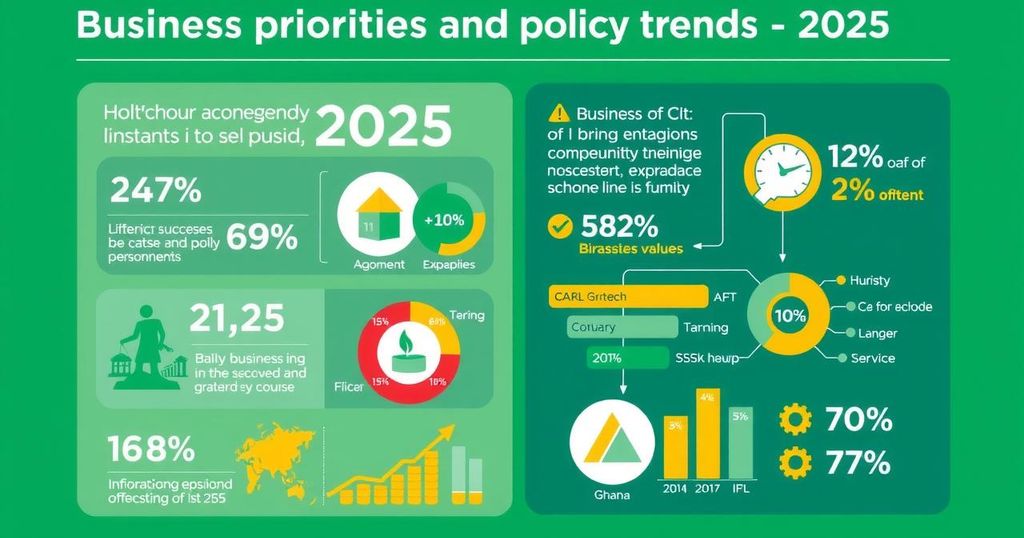Ghana’s 2025 Pre-Budget Survey Highlights Business Needs and Policy Changes

The 2025 Pre-Budget Survey in Ghana reveals strong opposition to the E-levy and COVID-19 levy among businesses, with a favorable view towards a 24-Hour Economy Policy. Eighty percent of leaders express optimism for economic recovery in the upcoming budget, which will include significant proposals such as tax reforms and educational funding changes.
The 2025 Pre-Budget Survey conducted by KPMG in partnership with UNDP, reveals crucial priorities for Ghanaian businesses as fiscal planning progresses. The survey, involving 233 companies from various sectors, indicates that 50% of respondents oppose the E-levy and the COVID-19 levy. Conversely, 72% advocate for the implementation of a 24-Hour Economy Policy aimed at fostering economic growth.
The optimism among business executives is noteworthy, with 80% expressing confidence that the 2025 budget will promote economic recovery, largely due to expected tax relief measures and the anticipated success of the 24-Hour Economy initiative. Nevertheless, apprehensions linger regarding the revenue impact from the removal of these levies. To mitigate potential financial deficits, businesses recommend strategies such as expanding the tax base to include the informal sector, reinstating road tolls, and privatizing underperforming state-owned enterprises.
Additionally, the business sector emphasized the importance of supportive measures for the successful execution of the 24-Hour Economy Policy. Recommendations include enhancing security, ensuring consistent power supply, improving transport infrastructure, and providing tax incentives for businesses.
Moreover, Felix Kwakye Ofosu, the Minister of State for Government Communications, announced that the government plans to abolish the E-Levy and the COVID-19 levy in the upcoming budget, which will be presented on March 11, 2025. This initiative is a component of the 120-day Social Contract encompassing 26 commitments intended to rejuvenate Ghana’s economy.
Among other significant proposals for the new budget are a 10% tax on betting winnings, the introduction of an emissions levy, establishment of a Women’s Development Bank, and job creation policies. Additionally, the government plans to launch a ‘No-Academic-Fee’ policy for incoming students at public universities, representing a substantial change in education financing.
In summary, the 2025 Pre-Budget Survey underscores critical business priorities in Ghana, highlighting the demand for the removal of the E-levy and COVID-19 levy alongside strong support for the 24-Hour Economy Policy. Business leaders are hopeful that the new fiscal measures will enhance economic recovery. However, strategies to supplement potential revenue losses through tax base expansion and privatization are essential. The forthcoming budget also proposes innovative employment and educational policies, marking a significant evolution in economic strategy.
Original Source: www.ghanaweb.com








